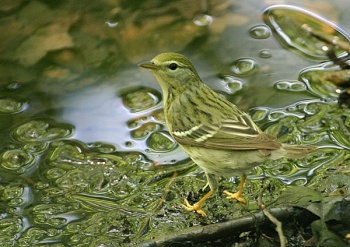- Setophaga striata
Dendroica striata
Identification
All ages
- Yellow legs (blackish in most other Setophaga species)
Summer male
- Dark-streaked brown back
- White face
- Black crown
- White underparts with black streaks
- Two white wing bars
Female
- Paler than summer male
- Grey crown and face
Non-breeding
- Green heads
- Dark-streaked green upperparts
- Yellow breast
- Yellow extending to the belly in young birds.
Distribution
Breeds in northern boreal forests from Alaska south to central Canada (absent only from southern Canada and extreme arctic Canada. In the United States breeds in northern Maine, New Hampshire, Vermont and in the Adirondacks and Catskills in New York.
Migrates mainly through the eastern United States. Their fall migration route is notable, as many take off from south-eastern Canada and north-eastern US and fly non-stop over the western Atlantic to South America; they average 11 grams when they depart and 7 when they arrive. Scarce on migration west of Mississippi, but a few reach as far west as California, mainly in fall.
Winters in northern South America, mainly in the western Amazon basin, south to about 15°S.
Casual to accidental vagrant to Greenland (7 records), Iceland (6 records), Ireland (9 records), Great Britain (46 records), France (2 records), and Galapagos Islands (1 record).
Taxonomy
This is a monotypic species[1].
Formerly placed in the genus Dendroica.
Habitat
Mature deciduous trees, coniferous forest, particularly spruce, cypress trees in coastal scrub. Swampy woodland. Also urban parks on migration.
Behaviour
Diet
The diet includes insects, but berries are taken in the winter.
Breeding
The 4-9 eggs are laid in a cup-shaped nest which is placed in a conifer.
References
- Clements, J. F., T. S. Schulenberg, M. J. Iliff, D. Roberson, T. A. Fredericks, B. L. Sullivan, and C. L. Wood. 2014. The eBird/Clements checklist of birds of the world: Version 6.9., with updates to August 2014. Downloaded from http://www.birds.cornell.edu/clementschecklist/download/
- BF Member observations
- Wikipedia






